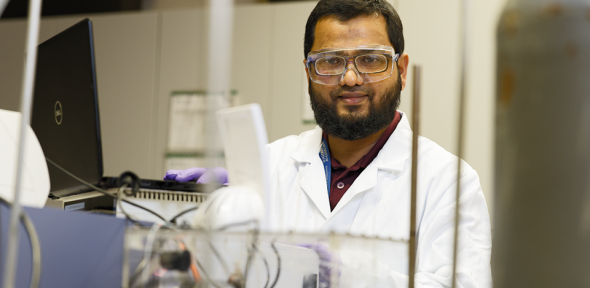
Hassan Mobassar, taken by Michael Webb ©University of Cambridge.
Two years ago Hassan shared his experience of researching and lecturing with a lifelong stammer and the techniques he used to enhance his science communication. This is an update on his experiences since then.
Dr Mobbassar Hassan Sk is a senior research associate in the Paul Davies and Mike Casford Group. Since then, Hassan has been on two training courses and has developed new techniques and can now control his speech without stammer.
Starfish and Empowering Voices
Hassan attended workshops from two different organisations (Starfish and Empowering Voices) and both have been crucial on his journey. His first course was with Starfish in 2022, then he attended Empowering Voices (2024) which helped him learn ‘costal breathing’, the technique that helps him control his voice.
Two interviews with Mobassar. The first was taken two years ago and the second, at 4:00, taken the most recently.
Hassan explains the technique: “Costal breathing is taking fast and full breaths, speaking at the top the breath with deep tone, releasing the extra breath completely with pause, smile with eye contact. Costal breathing helps me get more air so I get a better quality of sound when I speak.
“A useful teaching for me was focusing on the vibrations in my chest for deep tone when I speak as opposed to in my mouth which has helped me speak louder as well. To be able to visualise that I am talking with my chest rather than with my mouth has been very helpful. All these bits come as a package and with practise in various situations full technique will gradually become inherent.
“For me the change has been in every aspect of my life, like this interview we’re having now. It was a big challenge for me to deliver talks and I would use a speech synthesiser.
“If there are situations where I can’t use the technique my speech starts to trip over. The stammer doesn’t go away but I have met people who have been using this technique for decades and it becomes inherent.”
In situ research
Hassan worked with Stuart Clarke until 2023 and then joined another project with Paul Davies and Mike Casford on lubrication research. Lubrication oil has thousands of chemical components that are difficult to analyse as a complete product and it is essential to separate the components to analyse them individually. He has developed an in house technique to separate lubrication components and analyse them individually using a range of analytical techniques.
Alongside this research, he is also working on battery research looking at corrosion. “I’m gradually shifting my experience and techniques. In my previous projects I developed techniques for in situ analysis and now I am applying them to battery research.”
In his previous project he has designed and developed a unique suite of custom made in situ sample-cells where specific high resolution analytical techniques are combined with simultaneous electrochemical measurement capability to study interfacial degradation/corrosion of batteries in real time under conditions of commercial relevance.
Community
Since the course, Hassan joined the empowering-voice (a 100% charity organisation) support group and went to the course refresher where he helped newcomers to learn the technique, he also joined ‘The Cambridge Self-help Group for Adults Who Stammer’. Both these groups call for regular monthly meetings for sharing ideas and practise various skills and they are approved by the British Stammering Association (STAMMA), the largest UK charity and membership organisation representing people who stammer.
The University of Cambridge sponsored Hassan’s training with Empowering Voice and he adds: “The support I have had has been very helpful. I thank the University, my supervisor and colleagues – Paul Davies, Stuart Clarke, Mike Casford, Nick Bampos and James Keeler – who have been very supportive.”
